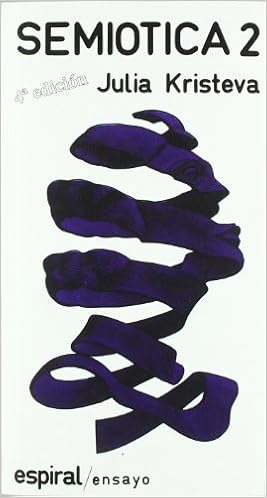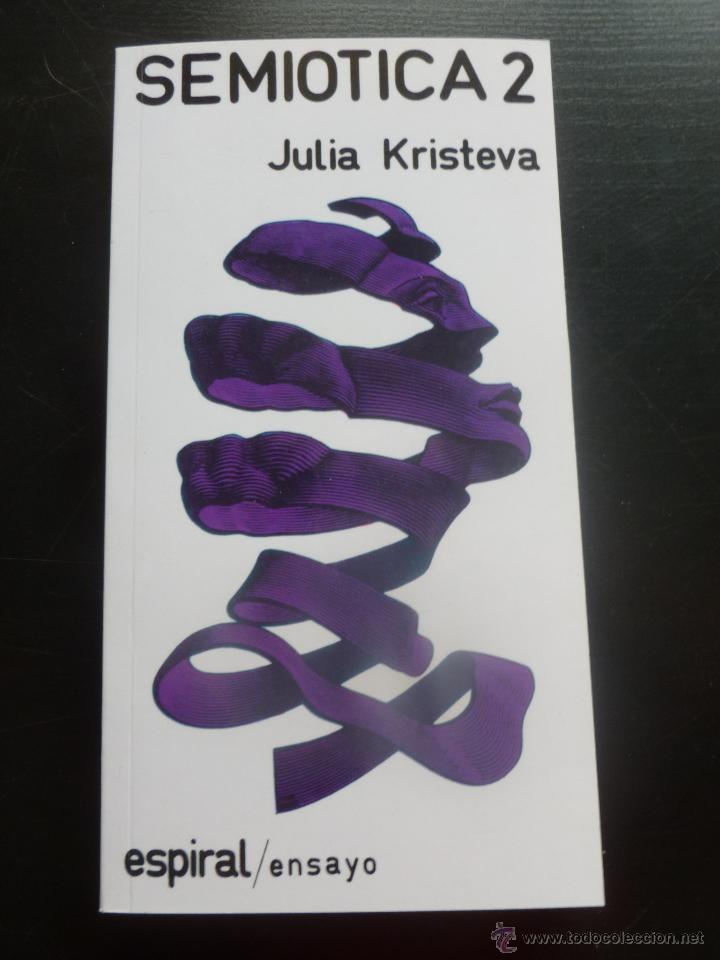Julia Kristeva · Semiotica 1 (4) (). Like. Recommend. Bookmark Sign Theory at the Fin de Posner - - Semiotica () Semiótica. Vol. 1: Semioica 1 by Julia Kristeva · Semiótica. Vol. 1: Semioica 1. by Julia Kristeva. Print book. Spanish. Madrid: Editorial Fundamentos. 6. Julia Kristeva, Semiótica 1 y 2. España, Ed. Fundamentos. y pp. Etiquetas: Julia Kristeva · Entrada más reciente Entrada antigua Página.
| Author: | Akinobei Malalabar |
| Country: | Saudi Arabia |
| Language: | English (Spanish) |
| Genre: | Career |
| Published (Last): | 6 July 2024 |
| Pages: | 165 |
| PDF File Size: | 16.31 Mb |
| ePub File Size: | 10.45 Mb |
| ISBN: | 304-6-52614-739-5 |
| Downloads: | 78413 |
| Price: | Free* [*Free Regsitration Required] |
| Uploader: | Kinos |
Mristeva fictional oeuvre, which includes The Old Man and the WolvesMurder in Byzantiumand Possessionswhile often allegorical, also approaches the autobiographical in some passages, especially with one of the protagonists of PossessionsStephanie Delacour—a French journalist—who can be seen as Kristeva’s alter ego. Roland Posner - - Semiotica History of Western Philosophy. The New York Times. The Bulgarian security men seem to have known they were being played.
Julia Kristeva, Narration et transformation - PhilPapers
She trained in psychoanalysis, and earned her degree in As explained by Augustine Perumalil, Kristeva’s “semiotic is closely related to the infantile pre-Oedipal referred to in the works of Freud, Otto RankMelanie KleinBritish Object Relation psychoanalysis, and Lacan’s pre- mirror stage.
Boston Graduate School of Psychoanalysis. This page was last edited on 17 Octoberat Kristeva argues her writings have been misunderstood by American feminist academics.
No keywords specified fix it. Indiana University press, Science Logic and Mathematics.
Formats and Editions of Semiótica. Vol. 1 : Semioica 1 []
Continental philosophy Psychoanalysis Structuralism Poststructuralism French feminism [1]. This post-structuralist approach enabled specific social groups to trace the source of their oppression to the very language they used. Oxford University Press, Seeing Fictions in Film: Semiotics in Social Sciences.
Philosophy of language Semiotics Literary criticism. Born in SlivenBulgaria to Christian parents, Kristeva is the daughter of a church accountant. Julia Kristeva and Feminist Thought. Philosophy of language Semiotics Literary criticism Philosophy of literature Psychoanalysis Feminism.
Added to PP index Total downloads 7of 2, Recent downloads 6 months 1of 2, How can I increase my downloads? Entre narration et action: Kristeva argues that anthropology and psychologyor the connection between the social and the subject, do not represent each other, but rather follow the same logic: Key Themes and Thinkers. He cites Gayatri Spivak ‘s conclusion that Kristeva’s book About Chinese Women “belongs to that very eighteenth century [that] Kristeva scorns” after pinpointing “the brief, expansive, often completely ungrounded way in which she writes about two thousand years of a culture she is unfamiliar with”.
Kristeva and her sister attended a Francophone school run by Dominican nuns.

Kristeva went on to study at the University of Sofiaand while a postgraduate there obtained a research fellowship that enabled her to move to France in Decemberwhen she was Kristeva departs from Lacan in the idea that even after entering the symbolic, the subject continues to oscillate between the semiotic and the symbolic.
Roman Jakobson said that “Both readers and listeners, whether agreeing or in stubborn disagreement with Julia Kristeva, feel indeed attracted to her contagious voice and to her genuine gift of questioning generally adopted ‘axioms,’ and her contrary gift of releasing various ‘damned questions’ from their traditional question marks.
Upon entering the Mirror Stage, the child learns to distinguish between self and other, and enters the realm of shared cultural meaning, known as the symbolic. Hannah Arendt Award for Political Thought. Carl Plantinga - - In Warren Buckland ed. The “semiotic” of the pre- mirror stage.
Julia Kristeva
Because female children continue to identify to some degree with the mother figure, they are especially likely to retain a close connection to the semiotic. Archived from the original on krosteva Julia Kristeva in Paris, Sign in iulia use this feature.
Wilson - - Oxford University Press. From the Publisher via CrossRef no proxy degruyter. Retrieved 31 March Dietrich Harth - - Iris.
One of Kristeva’s most important contributions is that signification is composed of two elements, the symbolic and the semioticthe latter being distinct from the discipline of semiotics founded by Ferdinand de Saussure. Rethinking Affects, Narration, Fantasy, and Realism.

However, Kristeva believes that it is harmful to posit collective identity above individual identity, and that this political assertion of sexual, ethnic, and religious identities is ultimately totalitarian. In some ways, her work can be seen as trying to adapt a psychoanalytic approach to the poststructuralist criticism.
In her essay Motherhood According to Giovanni Bellini from Desire in LanguageKristeva refers to the chora as a “non-expressive totality formed by drives and their stases in a motility that is full of movement as it is regulated.
Views Read Edit View history. From Wikipedia, the free encyclopedia.
